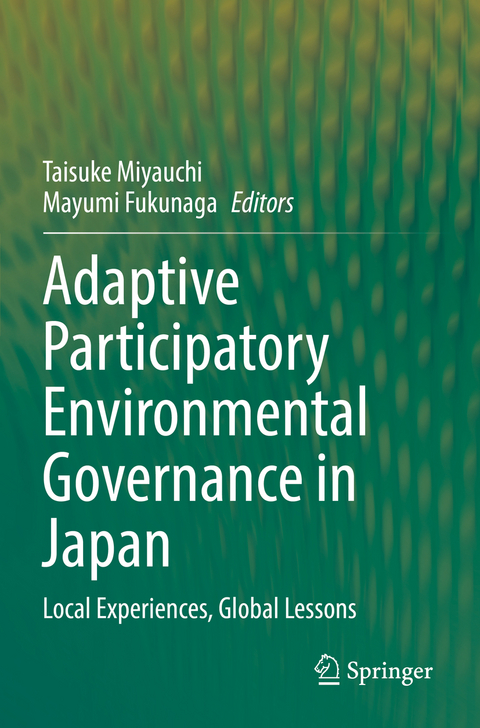
Adaptive Participatory Environmental Governance in Japan
Springer Verlag, Singapore
978-981-16-2511-4 (ISBN)
Of particular interest, both within Japan and beyond, the book shares with readers how to design and manage practical governance methods with narratives. The detailed design methods include co-imagination of historical and current SESs, designing processes for collaborative productions of knowledge and perceptions, legitimacy and stakeholder-ness, contextualization of contested experiences among actors, and the creation of evaluation standards of what is effective and effective local environmental governance.
The case studies and their findings reflect particular local contexts in Japan, but our experiences of multiple natural disasters, high economic growth and development, pollutions, the nuclear power plant accident, and rapidly aging society provide shared contexts of realities and provisional insights to other societies, especially to Asian societies.
Taisuke Miyauchi is a Professor of the Faculty of Humanities and Human Sciences at Hokkaido University in Sapporo, Japan. As an environmental sociologist, he has researched the social-ecological systems of several areas in the Solomon Islands and Japan. He specializes in natural resources management, community development, and environmental governance. He has led some research projects on environmental governance, including the MEXT KAKENHI (Grants-in-Aid for Scientific Research Program)project titled "Sociological study on adaptive governance in uncertainty and plurality.” His authorship includes Kaihatsu to seikatsu senryaku no minzokushi (An ethnography of development and livelihood strategies) and Hitobito no shizensaisei (Nature regeneration and local people). He is also interested in the social history of the fishing industry, and coauthored Katsuobushi to Nihonjin (Dried bonito and Japanese people). Miyauchi has edited and published several books as well, including Hansaibai no kankyō shakaigaku (Environmental sociology of semi-nature), Naze kankyō hozen wa umaku ikanai noka? (Why does environmental conservation fail?), and Dōsureba kankyō hozen wa umaku iku noka? (How can environmental conservation work?). Additionally, having been focused on the reconstruction and recovery following the Great East Japan Earthquake, he edited and published Saigai to chiiki saisei (Disaster and community regeneration). Mayumi Fukunaga is an Associate Professor of Environmental Sociology and Ethics at the Department of Socio-Cultural Environmental Studies, Graduate School of Frontier Sciences, the University of Tokyo, Japan. Her works center on interdisciplinary issues at the interface of ethics, environmental governance, and ontological histories of non-human species, particularly in connection with aquaculture politics in the aftermath of natural and anthropogenic disasters, environmental justice in co-designing social-ecological systems, and foodscapes and foodways in the Anthropocene. Her most recent book is Sake wo tsukuru hitobito: Suisanzōshoku to shigensaisei (Futuring Salmon: Dreams of Marine Ranching in Ruins), and she is the coeditor of Mirai no kankyō rinrigaku (Environmental Ethics for Futures). Her recent non-humans of focus are seaweeds including seaweeds as communicator species of social-ecological systems’ resilience and rainbow trout as a cosmopolitan and tech-adaptable species.
Chapter 1.Introduction: : Legitimacy, Adaptability and Narrative-based Design.- Chapter 2. Reeds and Rights: Dynamism of Legitimacy Construction in the Management of Collective Natural Resources.- Chapter 3. Forests to Revitalize Local Society; Adaptive Contribution Projects for Legitimacy by Mountain Bikers.- Chapter 4. Creating space for creativity: Agricultural canals and an endangered species.- Chapter 5. The Satoyama Movement and its Adaptability: Beyond Ideology and Institutionalization.- Chapter 6. Re-contextualizing Wildlife Management to Community Revitalization.- Chapter 7. Listening to Nori Seaweed to Learn How to Better Live with the Sea for Urban Fishers: The Importance of Ecological Reflexivity for Environmental Governance.- Chapter 8. Complex Ties: Governance for Supporting Nuclear Evacuees.- Chapter 9. Resilience and invisible damage: The 2011 nuclear accident and natural resources management. Chapter 10. BThe Governance of Renewable Energy Projects and Expanded Distributive Justice.- Chapter 11. Trial of Tools to Evaluate Adaptive Processes in Environmental Activities.- Chapter 12. Narratives for Actualizing Local Knowledge to Empower Participatory Biosphere Reserve governance.- Chapter 13. Narratives Crossing Jurisdictions; Watershed-scale Collaborations for Adaptive Decisions and Actions.- Chapter 14. Science To Govern Urban Heat Risk In Fukuoka City, Japan: What Can A Historical Perspective Teach Us?.- Chapter 15. Action Research within Multi-layered Hegemonic Structure: 'Workshop' for Adaptive Governance.- Chapter 16. Empathy-based Assistance and its Transformative Role in the Adaptive Cycle of Collaborative Governance.
| Erscheinungsdatum | 20.06.2023 |
|---|---|
| Zusatzinfo | 1 Illustrations, black and white; XI, 356 p. 1 illus. |
| Verlagsort | Singapore |
| Sprache | englisch |
| Maße | 155 x 235 mm |
| Themenwelt | Sachbuch/Ratgeber ► Natur / Technik ► Natur / Ökologie |
| Naturwissenschaften ► Biologie ► Ökologie / Naturschutz | |
| Naturwissenschaften ► Geowissenschaften | |
| Sozialwissenschaften ► Soziologie | |
| Technik ► Umwelttechnik / Biotechnologie | |
| Schlagworte | Adaptability and resilience • Co-Learning • Environmental Governance • Legitimacy • Narrarives in governance • plurality • Process-oriented collaborative environmental governance • Redundancy • Social ecological system • Stakeholder-ness • Uncertainty |
| ISBN-10 | 981-16-2511-5 / 9811625115 |
| ISBN-13 | 978-981-16-2511-4 / 9789811625114 |
| Zustand | Neuware |
| Haben Sie eine Frage zum Produkt? |
aus dem Bereich


